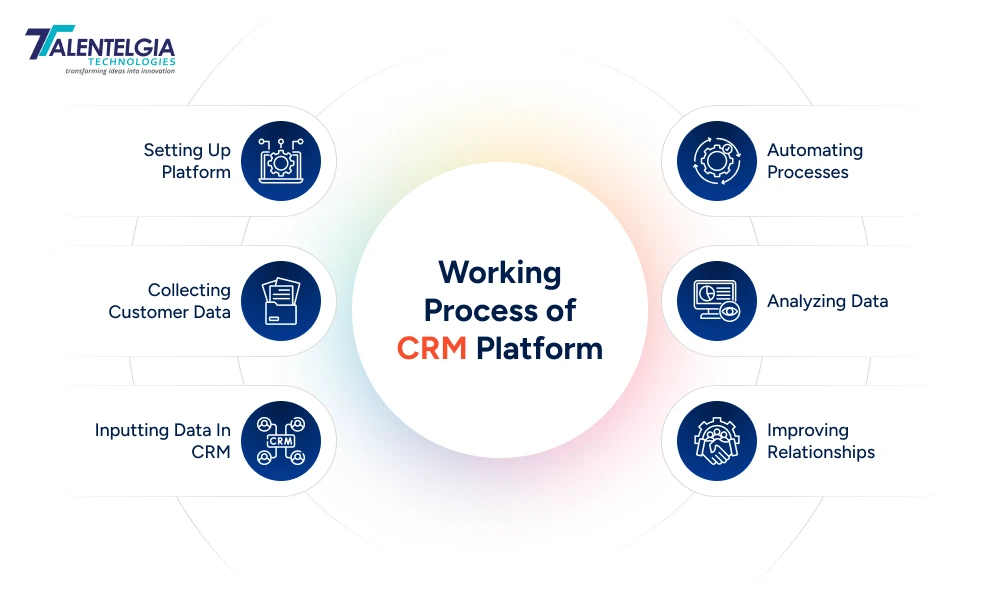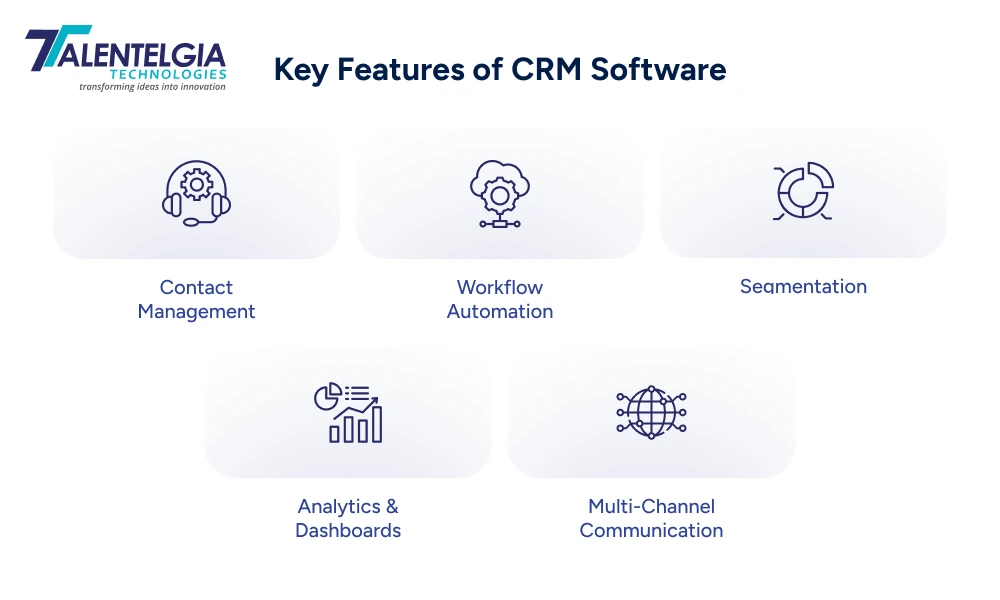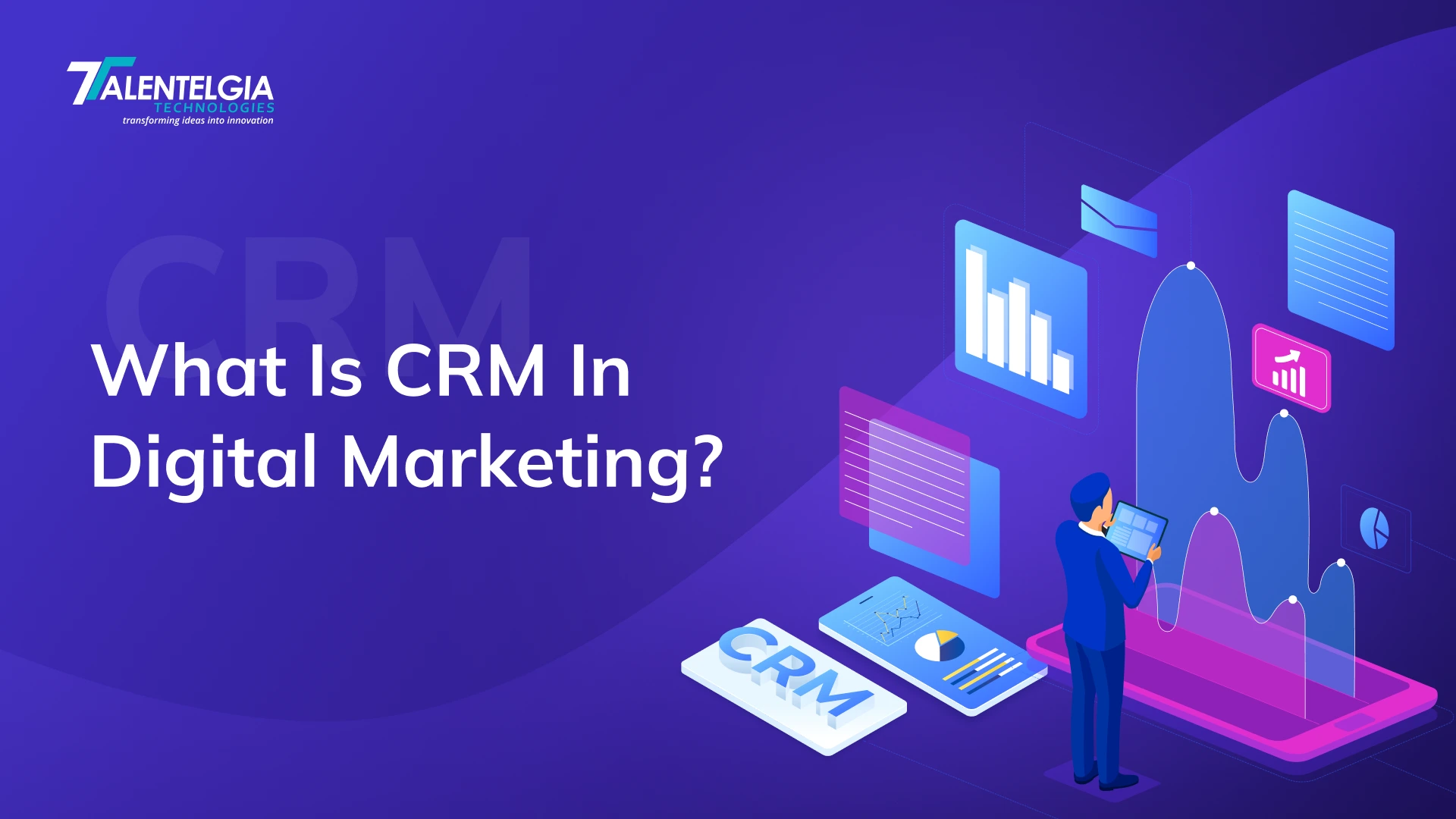In today’s hyperconnected world, businesses have countless ways to interact with their audience— emails, social media, websites, and beyond. But with so much noise, how can brands build lasting, genuine relationships with their customers? This is where CRM, or Customer Relationship Management, becomes indispensable. Think of CRM not just as a tool, but as the heartbeat of modern digital marketing — fueling smarter campaigns, deeper insights, and authentic connections.
But what exactly are CRM systems capable of, and how can they be used to achieve success, specifically in digital marketing? In this article, we will explain what customer relationship management is, the purpose of CRM systems, and how they streamline the processes of customer acquisition, engagement, and retention.
Understanding CRM In Digital Marketing: Types, Working & Features
CRM systems are a crucial asset for organizations of any scale. It can improve your relationship with clients, monitor their journey with the business, and streamline your marketing strategies. If you still don’t use a CRM system, now is the best time to develop a CRM tailored to your work and business needs.It may as well be the reason through which businesses can achieve unparalleled success in their digital marketing strategies.
What Is a CRM?
Customer Relationship Management (CRM) is far more than a database; it’s a strategic approach to managing a company’s interactions with current and potential customers. At its core, CRM is designed to streamline processes, nurture relationships, and improve profitability by leveraging collected data and insights. While some marketing tools might focus solely on automating emails or tracking website visits, CRM brings it all together: sales history, customer preferences, communication records, and behavioural trends, forming a unified view of every customer.
Overall, CRM in digital marketing can be a great asset towards managing customer relationships. Improved customer targeting and market segmentation have a clear correlation with marketing outcomes. The use of customer relationship management helps to ensure that the communications are relevant, effective, and productive from the customer and business perspectives.
Just as no two businesses are alike, CRM comes in a variety of flavours:
- Operational CRM: handles day-to-day processes such as automating sales, marketing, and service tasks.
- Analytical CRM: dives deep into customer data for trend analysis, forecasting, and campaign optimization.
- Collaborative CRM: fosters the sharing of customer information across teams, enhancing communication and coordination.
When it comes to marketing, analytical and collaborative CRM often shine by enabling smarter targeting and cohesive customer experiences.
How Does a CRM Platform Work In Digital Marketing?
After understanding the meaning of the CRM system, let’s see its working process in digital marketing and how it supports digital marketing services. Customer Relationship Management is an organizational strategy devised in response to the need to boost customer satisfaction and build loyalty. By analyzing data concerning customer behavior, businesses can gain more accurate knowledge of various customer needs and preferences. Organizations are then able to tailor the customer experience and enhance marketing.

If you’re on this side of the internet, then it’s quite likely that you’ve come across some famous CRM software like HubSpot, Zendesk, Salesforce, Zoho, and Freshsales. But how do they work? Most CRM software provides a guide and lays down the steps involved in setting up a CRM system, which includes the following:
- Setting Up Platform: Choose and configure a CRM system that integrates seamlessly with your digital channels, define clear marketing goals, and connect all relevant data sources.
- Collecting Customer Data: Gather information from every customer interaction— website visits, social media engagements, email clicks, and purchases, to build robust profiles.
- Inputting Data into CRM: Import data automatically from integrations or manually as needed, evaluating and cleaning it to maintain accuracy and usability.
- Automating Processes: Use the CRM’s automation features to trigger personalized emails, schedule follow-up tasks, and launch targeted marketing campaigns based on customer behaviours.
- Analyzing Data: Leverage built-in dashboards to track metrics like engagement rates, conversion, and retention; use insights to assess the effectiveness of marketing strategies.
- Improving Relationships: Apply data-driven insights to personalize communication, anticipate needs, resolve issues quickly, and nurture ongoing customer loyalty.
This is just a brief, generic overview of how a CRM system works. Each platform has its own distinct features that are different from one another. These features can be configured to meet the company’s requirements.
You can also read step by step process on How To Build a CRM?
5 Key Features of CRM Software in Digital Marketing
CRM software systems help marketing teams focus their attention to strategic, rather than operational issues, by using tools for repetitive marketing operations and sales workflow management. This type of CRM automation helps companies to deliver custom, latest, and targeted marketing communications on time, based on behavioral triggers or established parameters.
For instance, consider a case where a lead takes a certain action, such as downloading a white paper. This step initiates the CRM marketing system to perform the next action in the sequence, such as sending a follow-up email, to make certain that the lead does not get neglected or does not receive disjointed attention.

CRM software in digital marketing is packed with robust features that elevate customer engagement and streamline marketing workflows. Here’s a closer look at five essential features every marketer should expect:
- Contact Management: Store and organize key customer information, including demographics, purchase history, and interaction details, providing a complete view to personalize communications and marketing strategies.
- Workflow Automation: Automate repetitive marketing tasks, such as sending follow-up emails, assigning leads, and launching campaigns, freeing up time for teams to focus on strategy and innovation.
- Segmentation: Group customers based on specific criteria (like location, behaviors, or purchase history) to deliver highly targeted campaigns, increasing relevance and boosting conversion rates.
- Analytics & Dashboards: Visualize campaign performance, track engagement metrics, and generate actionable insights to fine-tune marketing tactics and demonstrate ROI.
- Multi-channel Communication: Coordinate customer interactions across email, social media, SMS, and more, ensuring seamless experiences and consistent messaging at every touchpoint.
These features empower marketers to build deeper, more data-driven relationships with their customers, amplifying digital campaign results.
8 Benefits of CRM In Digital Marketing [2025]
Running a business is a complex undertaking. Almost every business employs around 1000 unique softwares, of which only 28% of these apps are integrated.
To remain competitive, a firm’s strategy must revolve around its customers and be architected using appropriate tools. However, distilled actionable business intelligence that is current and precise can be elusive. How do you transform and consolidate the disparate data generated by sales and post-sales customer engagements, promotions, and social assets into meaningful business knowledge?
The answer lies with a CRM solution. Here are some of the benefits of a CRM database are crucial for your business.
1. Improved Customer Satisfaction
CRM systems collect and track every interaction a customer has with your brand, enabling faster and more personal responses. This comprehensive understanding helps resolve issues efficiently and anticipates customer needs, making clients feel valued and heard.
- Keeps communication personalized and timely
- Provides history for context in support
- Helps identify potential issues early
- Enhances customer trust and loyalty
- Facilitates proactive service and engagement
2. Increased Customer Loyalty
By leveraging detailed customer profiles, CRM allows marketers to tailor offers and messaging that resonate on an individual level. This personalized approach fosters loyalty, encouraging customers to return and become brand advocates over time.
- Delivers content catered to preferences
- Builds emotional connection with customers
- Supports reward and loyalty programs
- Encourages repeat purchases and referrals
- Strengthens brand-consumer relationship
3. Higher Sales and Conversion Rates
CRMs help identify and prioritize leads based on behavior and engagement, so sales teams can focus their efforts where they’re most likely to succeed. Targeted campaigns and relevant offers increase the chances of converting prospects into customers.
- Enables effective lead scoring and management
- Facilitates targeted upselling and cross-selling
- Provides insight into buying behavior
- Streamlines sales processes with relevant data
- Improves conversion efficiency
4. Time and Cost Savings
Automation capabilities reduce the burden of repetitive tasks like sending follow-up emails and tracking leads manually. This efficiency saves resources and allows teams to focus on strategic marketing activities.
- Automates routine marketing workflows
- Reduces manual data entry and errors
- Improves campaign consistency and timing
- Streamlines customer follow-ups
- Lowers operational costs
5. Better Customer Segmentation
CRMs organize and analyze customer data to group audiences by behaviors, demographics, or preferences. This segmentation lets marketers craft hyper-relevant campaigns that resonate with each group, increasing engagement and conversion rates.
- Creates precise customer groups
- Enables targeted messaging
- Supports dynamic and evolving segments
- Reduces wasted marketing efforts
- Enhances campaign effectiveness
6. Enhanced Campaign Insights
With integrated analytics, CRMs provide real-time visibility into campaign success, customer engagement, and ROI. Marketers can adjust strategies based on data, optimizing performance continuously.
- Enables data-driven decision-making
- Tracks key marketing KPIs
- Identifies trends and patterns
- Supports A/B testing and experimentation
- Improves resource allocation
7. Improved Team Collaboration
Having a centralized customer database accessible to marketing, sales, and service teams improves coordination. It ensures consistent messaging and allows smooth transitions between departments, enhancing the overall customer experience.
- Breaks down departmental silos
- Supports shared customer profiles
- Facilitates better internal communication
- Accelerates lead hand-off and closure
- Unifies customer journey management
8. Consistent Multi-channel Communication
CRMs integrate data across channels like email, social media, SMS, and websites. This multi-channel approach ensures customers receive coherent, timely messages no matter where or how they engage with the brand.
- Provides seamless cross-channel experiences
- Maintains consistent brand voice
- Supports personalized messaging on preferred channels
- Tracks interactions from all touchpoints
- Strengthens customer engagement across platforms
Conclusion
CRM is much more than a contact management system — it’s the secret sauce for building authentic, rewarding customer relationships in digital marketing. By harnessing rich data, automation, and smart strategies, brands can boost engagement, loyalty, and growth in a world that demands personalization and sincerity. In the ever-changing digital landscape, a robust CRM approach isn’t just an advantage — it’s a necessity.


 Healthcare App Development Services
Healthcare App Development Services
 Real Estate Web Development Services
Real Estate Web Development Services
 E-Commerce App Development Services
E-Commerce App Development Services E-Commerce Web Development Services
E-Commerce Web Development Services Blockchain E-commerce Development Company
Blockchain E-commerce Development Company
 Fintech App Development Services
Fintech App Development Services Fintech Web Development
Fintech Web Development Blockchain Fintech Development Company
Blockchain Fintech Development Company
 E-Learning App Development Services
E-Learning App Development Services
 Restaurant App Development Company
Restaurant App Development Company
 Mobile Game Development Company
Mobile Game Development Company
 Travel App Development Company
Travel App Development Company
 Automotive Web Design
Automotive Web Design
 AI Traffic Management System
AI Traffic Management System
 AI Inventory Management Software
AI Inventory Management Software
 AI Software Development
AI Software Development  AI Development Company
AI Development Company  AI App Development Services
AI App Development Services  ChatGPT integration services
ChatGPT integration services  AI Integration Services
AI Integration Services  Generative AI Development Services
Generative AI Development Services  Natural Language Processing Company
Natural Language Processing Company Machine Learning Development
Machine Learning Development  Machine learning consulting services
Machine learning consulting services  Blockchain Development
Blockchain Development  Blockchain Software Development
Blockchain Software Development  Smart Contract Development Company
Smart Contract Development Company  NFT Marketplace Development Services
NFT Marketplace Development Services  Asset Tokenization Company
Asset Tokenization Company DeFi Wallet Development Company
DeFi Wallet Development Company Mobile App Development
Mobile App Development  IOS App Development
IOS App Development  Android App Development
Android App Development  Cross-Platform App Development
Cross-Platform App Development  Augmented Reality (AR) App Development
Augmented Reality (AR) App Development  Virtual Reality (VR) App Development
Virtual Reality (VR) App Development  Web App Development
Web App Development  SaaS App Development
SaaS App Development Flutter
Flutter  React Native
React Native  Swift (IOS)
Swift (IOS)  Kotlin (Android)
Kotlin (Android)  Mean Stack Development
Mean Stack Development  AngularJS Development
AngularJS Development  MongoDB Development
MongoDB Development  Nodejs Development
Nodejs Development  Database Development
Database Development Ruby on Rails Development
Ruby on Rails Development Expressjs Development
Expressjs Development  Full Stack Development
Full Stack Development  Web Development Services
Web Development Services  Laravel Development
Laravel Development  LAMP Development
LAMP Development  Custom PHP Development
Custom PHP Development  .Net Development
.Net Development  User Experience Design Services
User Experience Design Services  User Interface Design Services
User Interface Design Services  Automated Testing
Automated Testing  Manual Testing
Manual Testing  Digital Marketing Services
Digital Marketing Services 
 Ride-Sharing And Taxi Services
Ride-Sharing And Taxi Services Food Delivery Services
Food Delivery Services Grocery Delivery Services
Grocery Delivery Services Transportation And Logistics
Transportation And Logistics Car Wash App
Car Wash App Home Services App
Home Services App ERP Development Services
ERP Development Services CMS Development Services
CMS Development Services LMS Development
LMS Development CRM Development
CRM Development DevOps Development Services
DevOps Development Services AI Business Solutions
AI Business Solutions AI Cloud Solutions
AI Cloud Solutions AI Chatbot Development
AI Chatbot Development API Development
API Development Blockchain Product Development
Blockchain Product Development Cryptocurrency Wallet Development
Cryptocurrency Wallet Development About Talentelgia
About Talentelgia  Our Team
Our Team  Our Culture
Our Culture 
 Healthcare App Development Services
Healthcare App Development Services Real Estate Web Development Services
Real Estate Web Development Services E-Commerce App Development Services
E-Commerce App Development Services E-Commerce Web Development Services
E-Commerce Web Development Services Blockchain E-commerce
Development Company
Blockchain E-commerce
Development Company Fintech App Development Services
Fintech App Development Services Finance Web Development
Finance Web Development Blockchain Fintech
Development Company
Blockchain Fintech
Development Company E-Learning App Development Services
E-Learning App Development Services Restaurant App Development Company
Restaurant App Development Company Mobile Game Development Company
Mobile Game Development Company Travel App Development Company
Travel App Development Company Automotive Web Design
Automotive Web Design AI Traffic Management System
AI Traffic Management System AI Inventory Management Software
AI Inventory Management Software AI Software Development
AI Software Development AI Development Company
AI Development Company ChatGPT integration services
ChatGPT integration services AI Integration Services
AI Integration Services Machine Learning Development
Machine Learning Development Machine learning consulting services
Machine learning consulting services Blockchain Development
Blockchain Development Blockchain Software Development
Blockchain Software Development Smart contract development company
Smart contract development company NFT marketplace development services
NFT marketplace development services IOS App Development
IOS App Development Android App Development
Android App Development Cross-Platform App Development
Cross-Platform App Development Augmented Reality (AR) App
Development
Augmented Reality (AR) App
Development Virtual Reality (VR) App Development
Virtual Reality (VR) App Development Web App Development
Web App Development Flutter
Flutter React
Native
React
Native Swift
(IOS)
Swift
(IOS) Kotlin (Android)
Kotlin (Android) MEAN Stack Development
MEAN Stack Development AngularJS Development
AngularJS Development MongoDB Development
MongoDB Development Nodejs Development
Nodejs Development Database development services
Database development services Ruby on Rails Development services
Ruby on Rails Development services Expressjs Development
Expressjs Development Full Stack Development
Full Stack Development Web Development Services
Web Development Services Laravel Development
Laravel Development LAMP
Development
LAMP
Development Custom PHP Development
Custom PHP Development User Experience Design Services
User Experience Design Services User Interface Design Services
User Interface Design Services Automated Testing
Automated Testing Manual
Testing
Manual
Testing About Talentelgia
About Talentelgia Our Team
Our Team Our Culture
Our Culture

















 Write us on:
Write us on:  Business queries:
Business queries:  HR:
HR: 





